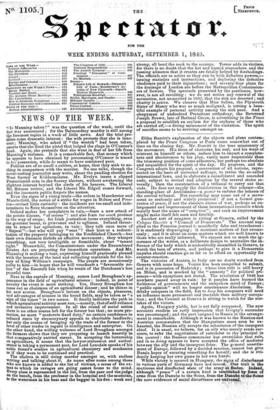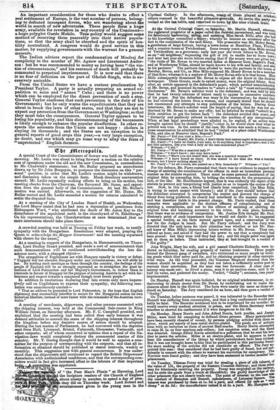Elihu Burritt's explanation of the objects and plans contem- plated
by the Peace Congress at Paris came somewhat out of time on the closing day. Mr. Burritt is the true missionary of the movement. His force of character, his zeal, and his want of mistrust in himself or others, induce him to impart a complete- ness and absoluteness to his plan, vastly more respectable than the trimming position of some adherents, but perhaps too absolute and unqualified for the spirit of the day. He proposes, and the Congress adopts his proposal, a convention of all nations, repre- sented on the basis of universal suffrage, to revise the so-called international laws, and to elaborate a consolidated and amended code, subject to revisal and adoption by the several states se- verally; then the construction of a tribunal to carry out that code. ' He does not supply the desideratum in this scheme—the standing-place of Archimedes—a power to enforce the behests of the central tribunal. But something may come out of a move- ment so zealously and widely promoted : if not a formal gua- rantee of peace, if not the absolute disuse of war, perhaps an en- largement and improvement of those international councils which usually bear the name of "congress"; and such an improvement might make itself felt soon and forcibly. Another sort of congress is sitting at Geneva, called by the Cologne Gazette a " Council of Democrats." The account sup- plied to the Prussian journal is manifestly false and treacherous : it is studiously disparaging ; it mentions matters of fact errone- ously ; and it is silent on some matters which are well known to those who are really informed. We suspect not so much the ig- norance of the writer, as a deliberate design to neutralize the in- fluence of the body which is undoubtedly assembled in Geneva, to watch the turn of events, and perhaps to give it a Democratic impulse should reaction go so far as to afford an opportunity for counter-reaction.
The victories of Austria in Italy are no doubt watched from Geneva with some hope. Venice has been compelled to submit, and is in possession of Radetzky; whose iron rule is still heavy on Milan, and is mocked by the " amnesty " for political pri- soners—with exceptions not stated. The revolution of 1848 has nowhere passed away in vain: by it peoples have learned the feebleness of governments and the outspoken. mind of Europe; "public opinion" will no longer countenance Absolutism. Ra- detzky conquers in the field, but to keep his conquests will need an influence more permanent and tractable than military occupa- tion ; and the Council at Geneva is sitting to watch for the mis- takes of the victors.
Again, Hungary yields, but is not fully conquered. The new accounts confirm an early impression that Giirgey'S surrender was prearranged ; and the part assigned to Russia in the arrange- ment is remarkable. Although it was known to the Russian and Austrian commanders that the Hungarians must soon be ex- hausted, the Russian ally accepts the submission of the insurgent chief. It is usual, we believe, for an ally who merely sends suc- cours, to refer the negotiations of surrender to the principal in the quarrel : the Russian commander has overridden that rule, and in so doing appears to have accepted the office of mediator between the ally and the insurgent force. The general unsettle- ment of Europe, followed by a decided reaction, cannot but give Russia hopes of securing something for hersblf; and she is sir'. dently keeping her own game in her own hapds. While victory is secured in Hungary, the signs of disturbeneS in various parts of Germany have not ceased. One trait is the mutinous and disaffected state of the army at Baden. Indeed, although '" peace" of a certain kind is established by force of arms from the Danube to the Seine, from the Danube to the Seine the sure evidences of social disturbance are universal.
An important consideration for those who desire to effect a real settlement of Europe, is the vast number of persons, belong- ing to defeated insurgent forces, who are wandering about the world in search of new adventures. These people form a huge army, available for revolution in any country of the Continent— a huge polyglot Garde Mobile. True policy would suggest some method of receiving them peaceably into their native popula- tions, so that the army shall be absorbed and the spirit of hos- tility neutralized. A congress would do good service in this matter, by supplying governments with the warrant for a general measure.
The Indian advices report the condemnation of Moolraj for complicity in the murder of Mr. Agnew and Lieutenant Ander- son: but he was recommended to mercy as having been " the vic- tim of circumstances," and his sentence of death will probably be commuted to perpetual imprisonment. It is now said that there is no fear of defection on the part of Gholab Singh, who is ex- cessively amicable.
From the United States we have a curious proclamation by President Taylor. A party is actually preparing an armed ex- pedition to seize and " annex " Cuba ; and there is no power which can be employed for the direct prevention of such a step. General Taylor confesses that such prevention is the duty of his Government ; but he only warns the expeditionists that they are about to break the laws of other states, and that they are not to expect any protection from the Government at Washington ; so that they must take the consequences. General Taylor appears to be losing his popularity, and this discountenancing of the buccaneers is likely enough to enhance the popular disaffection. In other re- spects the accounts from the Union are not happy : cholera is slaying its thousands ; and the States are an exception to the general reports of good crops this year,—a very large exception, no doubt, and one which may go some way to allay the fears of It unprotected" English farmers.



























 Previous page
Previous page